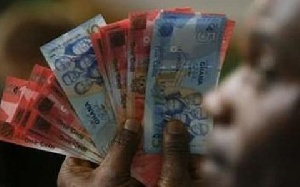 Mr. Oteng-Gyasi also wants government to allow the cedi to depreciate at the rate of the inflation
Mr. Oteng-Gyasi also wants government to allow the cedi to depreciate at the rate of the inflation
Former president of the Association of Ghana Industries, Tony Oteng-Gyasi is urging government to implement policies, backed by law, to save the economy from the influx of foreign goods.
He noted that because the economy is import driven, Ghana needs a behavioural change by “finding our own way to our development problem”.
Speaking at the second Media General Economic Dialogue Series in Accra Thursday, Mr. Oteng-Gyasi pointed out that policymakers should take interest in all indicators causing the cedi to depreciate.
The dialogue themed “The Ghana Cedi; Breaking the cycle of depreciation”, assembled speakers well vested in the Ghanaian economy to have a discourse.
Mr. Oteng Gyasi who is the Founder and Managing Director of Tropical Cable and Conductor Limited noted that whilst certain economies are making it difficult for Ghanaian products to penetrate their markets, same can’t be said of their products imported into the country.
“The structure of the world trade is so bias towards us”, he observed, asking government to put in place the legal framework to ensure that the Ghanaian market is not opened to every product irrespective of where it is coming from.
“The solution is not free money, cheap goods, cheap price, it is income generation that will give jobs to people and to buy products produced here,” he advised.
Inflation
Mr. Oteng-Gyasi also wants government to allow the cedi to depreciate at the rate of the inflation. If inflation is high and the cedi appreciates, it would be counterproductive because exporters would be affected and possibly kicked out of business, he explained.
Procurement
He noted that public procurement, through tendering, is a good venue for the government to get value for money as against sole-sourcing.
The former AGI president is also pushing for contractors to be paid in cedis for products purchased locally. The status quo is that the products are priced in cedis, but government pay in dollars to foreign contractors, he noted.